Maryland “Pan-Afrikan Town Hall 2” Scheduled for August 12 in Baltimore, Maryland
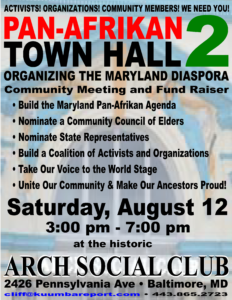 The work that was begun on June 24 with the Pan-Afrikan Town Hall Meeting at Baltimore’s historic Arch Social Club continues on Saturday, August 12 with the Maryland Pan-Afrikan Town Hall 2, a cooperative project of the Sixth Region Diaspora Caucus, Souls of Life Society, Teaching Artist Institute, Organization of All Afrikan Unity-Black Panther Cadre and the Arch Social Club.
The work that was begun on June 24 with the Pan-Afrikan Town Hall Meeting at Baltimore’s historic Arch Social Club continues on Saturday, August 12 with the Maryland Pan-Afrikan Town Hall 2, a cooperative project of the Sixth Region Diaspora Caucus, Souls of Life Society, Teaching Artist Institute, Organization of All Afrikan Unity-Black Panther Cadre and the Arch Social Club.
The event will continue the building of a Pan Afrikan Agenda for the Maryland Afrikan-Descendant Community, followed by the nomination of a Community Council of Elders and potential State Representatives who would promote the Maryland Pan Afrikan Agenda at national meetings such as the SRDC National Summit (which will be held this October in Nashville, Tennessee) and international gatherings such as Pan Afrikan Congresses, United Nations hearings, African Union meetings and other similar events when the Diaspora is invited to share its global perspectives.
The entire Pan-Afrikan Community is invited to come out to this Town Hall. For more information, please feel free to contact Bro. Cliff at cliff@kuumbareport.com.
Maryland Holds Successful Pan-Afrikan Town Hall Meeting June 24, 2017
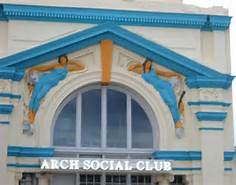 On Saturday, June 24, the Maryland Pan-Afrikan Town Hall was held at the historic Arch Social Club in the Penn-North neighborhood of Baltimore City, Maryland. Located at the intersection of Pennsylvania and North Avenues, Arch Social Club, the second-oldest Black social club in the country at over 105 years of age, has been a cultural and social fixture in the Penn-North neighborhood.
On Saturday, June 24, the Maryland Pan-Afrikan Town Hall was held at the historic Arch Social Club in the Penn-North neighborhood of Baltimore City, Maryland. Located at the intersection of Pennsylvania and North Avenues, Arch Social Club, the second-oldest Black social club in the country at over 105 years of age, has been a cultural and social fixture in the Penn-North neighborhood.
Penn-North became famous after the April 2015 rebellions that immediately followed the death in police custody of Freddie Gray. That incident had become this city’s symbol of the people’s anger in response to police abuse, much as the protests, rebellions and even riotous behavior on Ferguson, Missouri, in the wake of the killing of Michael Brown, and the massive street protests in New York City following the death of Eric Garner.
It was important to hold a Town Hall in Penn-North precisely because of the multiple ills that have afflicted this neighborhood: a lack of economic opportunity as demonstrated by the lack of fresh grocery stores (much of West Baltimore has been designated a food desert) and an increasing number of empty buildings that had once housed small businesses, a level of street crime that reflects that lack of economic opportunity and a populace desperate for some means of subsistence, a dearth of community centers and educational opportunities, a police force that sometimes behaves as colonial overlords and a populace that continues to search for answers to the age-old question, “Why are we catching hell?”
But Penn-North is not without its bright spots. A local branch of the Enoch Pratt Free Library sits across Pennsylvania Avenue from Arch Social Club, and a block to the east on North Avenue sits Everyone’s Place, a Black-owned bookstore that has often been a hub of Pan-Afrikan positivity. These beacons of hope in the community, along with Arch Social Club and several other Black-owned businesses, went largely unscathed during the unrest of April and May 2015, even as the CVS pharmacy across the street was burned to the ground during the rebellion. There are community members in Penn-North who are working diligently to make positive change in their neighborhood. And even the so-called “criminal element” generally shows some respect for Arch Social Club, the Library and Everyone’s Place, as well as other Black businesses and public services that bring a degree of relief and healing to the community.
The Pan-Afrikan Town Hall that was held on June 24 was sponsored by the Arch Social Club and the Maryland Organizing Committee of the Sixth Region Diaspora Caucus (SRDC), a Pan-Afrikan Diaspora organization that was founded in 2006 to organize the voice of the grassroots Afrikan Diaspora (those people of Afrikan descent who live outside the Afrikan Continent around the world) and to create a means by which that voice, which often goes unheard by the political, economic and intellectual elites, can be expressed on the World Stage. This generally means conferences held by the United Nations (such as occasional events held in New York by the UN’s Human Rights Commission to discuss police brutality), civil society bodies under the African Union (the AU has issued a standing invitation to the Diaspora to establish representatives on its Economic, Social and Cultural Council or ECOSOCC, though it has yet to finalize the acceptance of the plan to accomplish this that SRDC has submitted), or conferences and congresses established by Afrikan descendants in the Diaspora ourselves, such as Pan Afrikan Congresses and national or international conferences or panels by various Afrikan Diaspora organizations.
About the Sixth Region Diaspora Caucus and Its Mission
 SRDC gets its name from the fact that, in 2003, the African Union first designated the Diaspora as the Sixth Region of the Afrikan World, since the Northern, Southern, Eastern, Western and Central Regions of the Afrikan Continent had already been designated as Regions 1 through 5. Thus, the Diaspora, since it does not exist in any of those Regions of Afrika, would be the Sixth Region. It was the African Union (AU) which had initially inspired the founding of SRDC, though the AU’s often-maddening bureaucratic nature has caused enough suspicion among many of our people that it was necessary to widen SRDC’s focus, to not only include the AU as an objective, but also other international bodies, in the event the AU fails to open its doors completely to the Diaspora. In this way, SRDC has become a more independent Pan-Afrikan organization, ready to take the case of people of Afrikan descent wherever we need to in order to make our voices heard. It is not unlike the urging of Ancestor Malcolm X in 1964 for Afrikan-Americans to stop “taking our case from the wolf to the fox” and instead “take Uncle Sam before the world.”
SRDC gets its name from the fact that, in 2003, the African Union first designated the Diaspora as the Sixth Region of the Afrikan World, since the Northern, Southern, Eastern, Western and Central Regions of the Afrikan Continent had already been designated as Regions 1 through 5. Thus, the Diaspora, since it does not exist in any of those Regions of Afrika, would be the Sixth Region. It was the African Union (AU) which had initially inspired the founding of SRDC, though the AU’s often-maddening bureaucratic nature has caused enough suspicion among many of our people that it was necessary to widen SRDC’s focus, to not only include the AU as an objective, but also other international bodies, in the event the AU fails to open its doors completely to the Diaspora. In this way, SRDC has become a more independent Pan-Afrikan organization, ready to take the case of people of Afrikan descent wherever we need to in order to make our voices heard. It is not unlike the urging of Ancestor Malcolm X in 1964 for Afrikan-Americans to stop “taking our case from the wolf to the fox” and instead “take Uncle Sam before the world.”
What makes SRDC’s approach different from many others is the fact that it does not impose an Agenda on the grassroots communities from imminent professors, high-powered businessmen, powerful politicians, media personalities or intellectuals who “know” what our people need. Indeed, there are the occasional professors, business persons, members of the Black Media, and intellectuals involved, but there are also hardcore grassroots organizers, creative artists, spiritual leaders, revolutionary activists and “just plain folks” involved. In other words, everybody. This is not designed to be a “top-down” organization where the “leaders” tell the people what we are going to do. Instead, the Town Hall is the means by which the Community tells the organizers what issues are important to them, in the states or cities where they live, and the organizers must then take that information and develop a local Pan Afrikan Agenda from what the Community tells them. Local Pan-Afrikan organizers and activists, as well as the “average man or woman on the ground”, are all invited to participate and help build the Pan Afrikan Agenda, together.
Local organizing is important not just because SRDC believes every Community has the right to make its voice heard, but also because different local communities in different parts of the US and around the world often face different challenges. Though there are certainly issues we all have in common, from institutional racism and systemic discrimination, lack of economic opportunity, and even violence at the hands of repressive law enforcement, militia and vigilantes, certain localities still face problems that are, to a degree, unique. The Black Farmers of North Carolina face institutionalized rural Black land loss and the threat of industrial farming. Black communities in New Orleans live under the constant threat of hurricanes and other natural disasters, and the man-made disasters they often bring with them in the forms of redistricting, gentrification, police brutality, political disenfranchisement, environmental racism and urban Black land loss. Philadelphia, Pennsylvania is still reeling, to a degree, from the legacy of the violence imposed upon the Black Panthers in the 1960s and the MOVE Organization from the 1970s to today. Flint, Michigan is a glaring example of political disenfranchisement, official police abuse and environmental racism at their worst. And across the South and certain areas of the Midwest where Black people live in large enough numbers to make White people nervous, there is still much vigilante violence and official voter suppression, as well as violation of other civil and human rights. Thus, it’s important that localities across the United States and throughout the Global Diaspora meet and hold Town Hall Meetings such as these, so the concerns and solutions of the people who live in these places can be organized, expressed and acted upon, led by the people in a “bottom-up”, not “top-down”, fashion.
Another important objective of the Town Hall is the nomination and, ultimately, election of a Representative Team that would then present the local Pan Afrikan Agenda at SRDC’s annual National Summit, as well as at international meetings as the opportunity arises. That Team would consist of two (2) Representatives from each state (in the US; other countries and sub-regions of the Diaspora would determine their own systems for establishing their local and national spokespeople), along with up to six (6) Observers (“backups” to the Representatives who would assume those duties if a Representative were unable to continue), and a Council of Elders (whose primary tasks would be to advise the Representatives, correct mistakes and misdeeds by activists, organizers and Community members, and mediate disputes). All of these positions would work with the State Facilitator (a volunteer who usually is the person who started the organization in that state and essentially manages the process and helps ensure that the objectives are met) to bring the voice of the grassroots Community together and express that voice at the National Summit and international gatherings.
The June 24 Town Hall in Baltimore
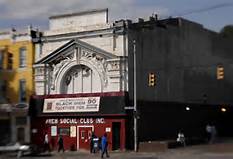
The Arch Social Club, “Back In The Day”.
After several years of reaching out to other Pan-Afrikan organizations, searching for viable locations at which to hold Town Hall Meetings, and using various means to try to inform the greater Community, the June 24 Town Hall actually looked like a Town Hall. Most of the Community members in attendance were from the Penn-North Community, which, although the objective was to bring people from across the city at least, was encouraging in that it was important to hear from people in this area about their concerns and also their suggestions on how to move forward. There were also a number of community activists and organizations present. Special mention must go, among others who I almost certainly will forget (my apologies in advance), to the Organization of All Afrikan Unity-Black Panther Cadre (OAAU-BPC), the Souls of Life Society, the Pan-Afrikan Liberation Movement (PLM), the Teaching Artist Institute (TAI, led by Sis. Kim Poole, who also provided a wonderful sample of vegan food from the Grub Factory, a Black-owned eatery connected with and officially endorsed by PLM), the Ujima Peoples Progress Party (UPP), the Maryland Chapter of Release Aging People in Prison (MD RAPP), BlackMen Unifying BlackMen (BMUBM), the National Black Unity News (a new publication that Elder David Murphy will be taking national), Leaders of a Beautiful Struggle (LBS), UmojaKhwest, and, of course, the Arch Social Club. There were also independent Pan-Afrikan activists, scholars and members of the Penn-North Community present, from teachers to business people to concerned residents, and all had constructive ideas to offer as to what our concerns were and what needed to be done to make the Community stronger. Education, reaching out to the youth, mass communication, economic opportunity, the need for community security, the need for political action and pressure on officials, the importance of consulting history and historical models of liberation, and strategies for building Community unity and Cooperative Coalitions among Pan-Afrikan and other Black organizations were all discussed.
The Follow-Up
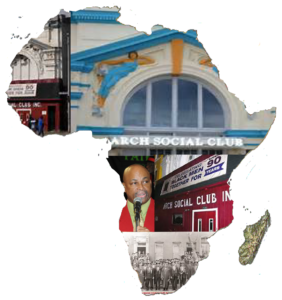
One of the most frustrating things I have found when attending meetings is the following statement, usually uttered at the end of the gathering: “This isn’t the end. We will continue this work. Our effort will not stop here!” This was usually the conclusive indicator that that particular organization would never meet again, and that it would quietly disappear from the people’s view. In this case, however, there will be a follow-up. Not just because SRDC has been at this for over ten (10) years now and many of us still have no desire to quit, but also because, at the June 24 meeting, the specific date and location of the next meeting was officially announced. The next meeting, which is currently being referred to as “Town Hall 2”, will be held on Saturday, August 12, 3:00 PM to 7:00 PM, again at the historic Arch Social Club. There, the Pan-Afrikan Agenda which was started at the June 24 meeting will be refined, additions will certainly be made, and some strategies for making some of the Agenda items a reality will be discussed, from organizing political pressure to building business cooperatives to creating community education programs. Nominations for Representatives, Observers and Elders will be taken. And further discussion on how to bring our many and varied Pan-Afrikan organizations and activists together in a Cooperative Coalition will be held. Not only is it nonsensical to call for unity when our organizations themselves have not effectively come together, but our communities will certainly be inspired to come together more constructively when they are inspired by seeing our organizations and activists doing the same.
By the time of that meeting, the next Town Hall, which may be called “Town Hall 3”, should also be scheduled. The plan is to hold several Town Hall Meetings at different locations around Baltimore City, from libraries to community centers to organizations and businesses with affordable rental spaces, and, if locations can be secured and the communities outside the city can be effectively reached, more Town Hall Meetings must be scheduled outside of Baltimore City. Since SRDC is entirely run by a group of Pan-Afrikan volunteers who do not get paid and have no operating budget, the progress of the Town Halls outside Baltimore City will depend on how our Communities in places such as Frederick, Cambridge, Columbia, and even Silver Spring, Maryland can be reached.
If you are aware of a location or community, in Baltimore City, elsewhere in the state of Maryland or anyplace where people of Afrikan descent can be found and are in need of an organizing tool such as this, do not hesitate to contact Bro. Cliff, Maryland State Facilitator of the Sixth Region Diaspora Caucus (and also the Editor of KUUMBAReport Online) by email at cliff@kuumbareport.com.
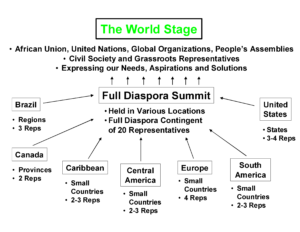
As we mentioned earlier, this same process can be used to develop an international Diaspora delegation to take our combined voice to the United Nations, the World Social Forum, environmental summits such as the Climate Change Conventions, or independent Pan-Afrikan Conferences that we might organize ourselves. The point here is really for the Pan-Afrikan Diaspora to take the responsibility, and with it the authority, to organize ourselves on the local, national and international level. At this point our influence and voice on the World Stage will increase dramatically, and our power to control our own destiny will finally be placed within our grasp.
